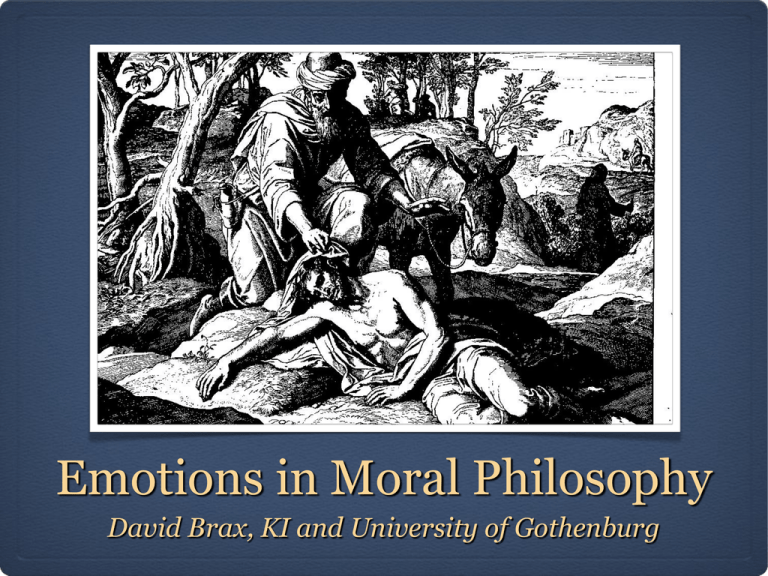Emotions in Moral Philosophy
advertisement

Emotions in Moral Philosophy David Brax, KI and University of Gothenburg Moral Philosophy • Applied Ethics: particular moral questions • Normative ethics: What ought we to do, generally? • Meta-ethics: Is there moral knowledge? Are there moral facts? What is the meaning of moral terms? • Moral psychology: How do moral faculties work? • My stance: Collaborative efforts should focus more on addressing meta-ethical questions, via moral psychology • Normative implications and applications: How should we treat people with moral dysfunction? Moral Sentimentalism • Moral Sentimentalism (David Hume) • Opposed to Rationalism (Immanuel Kant) • Moral judgments can’t be based on reason alone - emotions are needed • • In particular: sympathy The more precise role of emotion in morality was and remains unclear Emotion, Morality and Motivation • The link goes via motivation: To judge something right involves motivation to act accordingly • Emotions respond to, and constitute, certain facts as reasons • In order to be moral agents, we must be able to respond to reasons • Quite generally: emotions provide evaluative salience. ”Valence” Diffent Roles for Emotions • Projectivism/Subjectivism/Response Dependency: Moral Facts are those that cause certain emotional responses • • Expressivism: Moral Judgments express certain emotions • Focus: Emotions play a key role in moral learning/development. And in subsequent behavioral regulation Mental state theory: Emotional states constitutive moral facts: Emotions are what matters • Emotions are our primary source of moral evidence Emotion and Moral Responsibility • Emotional dysfunction is associated with anti-social behavior • Not restricted to ”passion crimes”: Emotional dysfunction inhibits the acquisition of moral abilities and moral knowledge • A subclass of ”Bad” people may be blameless due to ignorance, not of consequences, but of their moral significance • Ability to recognise that the emotional states of others matter is constitutive of morality. (Psychopaths as ”morally blind”) • Should they be held morally/legally responsible for this disability? • Depends on the function of criminal punishment (retribution, protection, rehabilitation, utility etc.) Summary • Moral sentimentalism: Emotions are central to morality, in a couple of ways: • 1) Emotions matters - they are constitutive of moral facts • 2) Emotions are central to moral knowledge, and to moral functioning • If an agent suffers from an emotional dysfunction, then she may lack moral evidence or capacity to assess the moral significance of her actions • Information about emotional dysfunction, then, should be considered when assessing moral responsibility, and when determining criminal punishment or treatment









